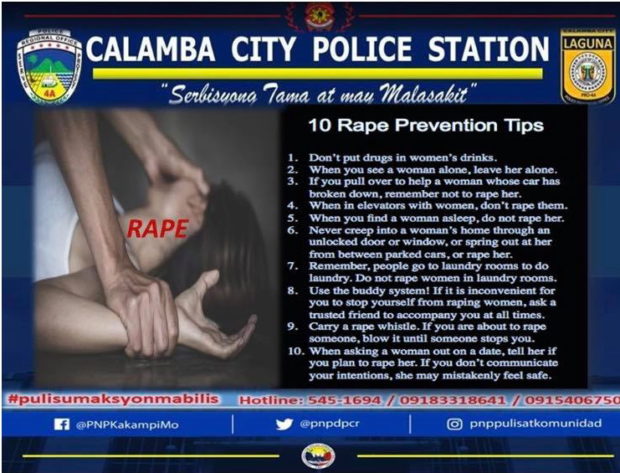Rape’s no joke, center tells Laguna cops

TAKEN DOWN The Calamba City police rehashed an internet post featuring rape prevention tips and shared this through its Facebook account. The post, which was shared by more than 500 Facebook users, was taken down on Thursday.
SAN PEDRO CITY—A list of funny and, perhaps, witty tips to “prevent rape” posted by the Calamba City police on its Facebook page may have had all the good intentions.
But a center helping victims of sexual violence based in the University of the Philippines Los Baños (UPLB) in Laguna said the people behind the list failed to exercise caution and sensitivity, noting that it was a government frontline office, like the police, which was using such in tackling a serious matter as part of its public awareness campaign.
The Calamba police rehashed an old internet post, titled “10 Rape Prevention Tips,” as its own along with other crime prevention do’s and don’t’s and posted them on its Facebook page recently. The city police added a slogan, “Serbisyong Tama at may Malasakit,” and police hotline numbers to call.
Mixed reactions
Media reports said the same antirape tips first appeared in a blog in 2011 and had since gone viral as it appeared to “refreshingly” target perpetrators rather than the victims.
It includes pointers like: “Use the Buddy System! If it is inconvenient for you to stop yourself from raping women, ask a trusted friend to accompany you at all times.”
Or, “Carry a rape whistle. If you find that you are about to rape someone, blow the whistle until someone comes to stop you.”
The Calamba police’s post got netizens talking, too, as some found it funny, while others lauded the use of satire in an attempt to deviate from the culture of victim-blaming.
In a telephone interview on Thursday, Police Lt. Col. Gene Licud, city police chief, initially said his office came up with the post after some “discussions” among his staff.
When pointed out that it was an old post, Licud said they took it from the internet, “which is an open source and [that] we only used what we thought was applicable to us.”
Message
It was not clear, however, why the Calamba police took the post down on Thursday afternoon. “The message for the women is ‘self-awareness.’ But the bottom line is for the other party (men) to exercise self-control,” Licud said.
Eric Peralta, director of the UPLB Gender Center agreed with the message but expressed reservations over the “phrasing.” “I laud the intention of the PNP (Philippine National Police) but we have to be careful [when talking about rape]. It has underpinnings that lacked gender sensitivity,” Peralta said. Sexual assault
Peralta cited one item which read: “Remember, people go to the laundry room to do their laundry. Do not attempt to molest someone who is alone in a laundry room.” “It might give an impression … Does that mean you should not rape someone in the laundry room but it’s OK elsewhere?” he said. In 2018, the police station of Angono town in Rizal province also issued some rape prevention tips, but quickly drew flak from women’s groups, which called them insensitive and a classic case of blaming female victims.
Among Angono police’s reminders advised women against wearing skimpy clothes, drinking alcohol on a date and to always carry a canister of pepper spray or tear gas. The police and the UPLB Gender Center’s records both showed that females remained the majority of victims of sexual assault and harassment.
Peralta said that in recent years, the center also had cases of sexual harassment involving members of the LGBT (lesbian, gay, bisexual, transsexual) community as victims.
‘Lust’
Licud said that aside from an online campaign, the city police also started establishing women’s help desks in its 54 villages, a provision in the Local Government Code but was often overlooked, he said.
“[Rape] suspects [during investigations] usually claimed they were drunk or something, but I think it all boils down to lust,” he said.
But Peralta disagrees, citing studies that showed that cases of sexual harassment usually involve an abuse of authority.
“With rape, there’s a plethora of reasons. We don’t know [what triggers it], otherwise we would have prevented rape from happening,” he said.














